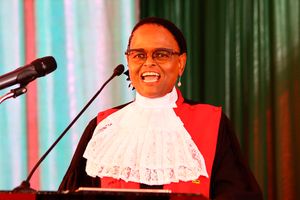
President William Ruto during the launch of the Sagana-Kathaka-Thiguku, Mahigaini-Kagio-Kangaita roads at Thiguku trading centre in Kirinyaga County on November 18, 2023.
President William Ruto suffered a setback last year when the courts issued orders blocking the implementation of key projects his administration wants to undertake.
Chief among them is the High Court's declaration that the Housing Levy, through which the Kenya Kwanza seeks to build over 250,000 housing units, is illegal. The government later moved to the Court of Appeal to challenge the ruling.
President Ruto's administration suffered another blow when the High Court halted the planned public participation on the Affordable Housing Bill, 2023, which had been introduced in Parliament to address the concerns raised by the High Court while quashing the housing levy.
The National Assembly had set December 28, 2023, as the deadline for receiving memoranda on the bill, but High Court Judge Jacqueline Kamau, sitting in Vihiga, stopped the debate pending the hearing of the case on January 17.
Apart from the controversial housing levy, the government's plan for the Social Health Insurance Fund, the privatisation of 11 parastatals including the Kenyatta International Convention Centre and the proposed privatisation of Lamu and Mombasa ports have also been put on hold by the courts.
The implementation of the Social Health Insurance Fund (SHIF), which would require every household in Kenya to contribute 2.75 percent of its income to the fund, was halted after the High Court was informed that Kenyans would be denied services if they were not registered with the fund.
The law makes it mandatory for all Kenyans to be members of a new social insurance scheme, which will replace the current National Health Insurance Fund (NHIF), in order to access government services.
The Kenya Kwanza administration also suffered another setback when the High Court halted plans to roll out Maisha Namba and Kenyans will be watching closely to see how the courts handle the matter.
Dr Ruto is determined to implement the housing project, arguing that Kenyans are already benefiting from it.
He said that apart from building affordable houses for Kenyans, his government is also targeting job creation, claiming that 120,000 jobs have been created since the program started.
The court halted the rollout of the Maisha Namba, a unique personal identification number assigned to the Maisha Card, a third-generation digital identity card, and the implementation of the National Master Population Register, which is intended to consolidate existing and independent databases into a single register.
The rollout was challenged by the Katiba Institute, which argued that the government lacked a legal basis for the rollout because there was no privacy impact assessment and the process was being conducted without meaningful public participation or publication of key information about the rollout.









